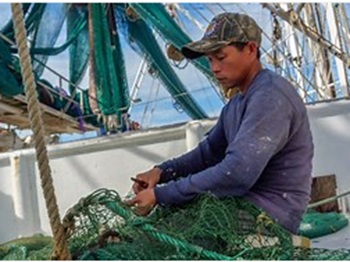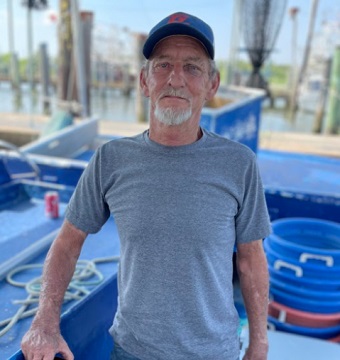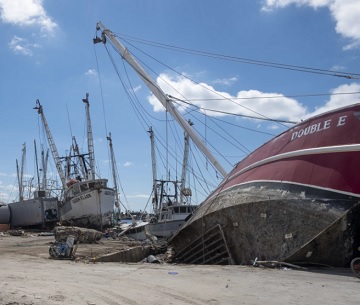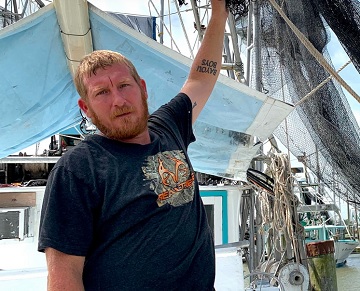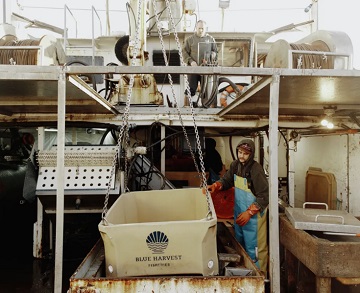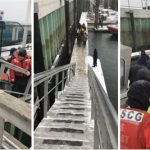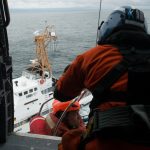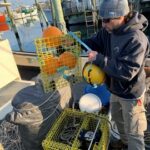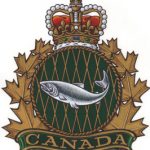Tag Archives: Gulf of Mexico
UPDATE: Coast Guard suspends search for F/V Miss Winnie fisherman
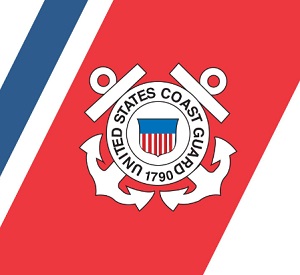 The Coast Guard suspended its search at roughly 5:30 p.m. Monday for a missing commercial fisherman roughly 138 miles southwest of Port Fourchon, Louisiana. Crews searched more than 46 hours and over 2000 square miles. Assets involved in the search were: U.S. Coast Guard Aviation Training Center HC-144 Ocean Sentry, U.S. Coast Guard Air Station Corpus Christi HC-144 Ocean Sentry, U.S. Coast Guard Cutter Jacob Poroom Good samaritan commercial fishing vessel F/V Kenneth ColeThe Coast Guard suspended active search efforts after the probable search area was saturated with multiple assets and resources. The incident is currently under investigation. -USCG- >>click to read<< 08:45
The Coast Guard suspended its search at roughly 5:30 p.m. Monday for a missing commercial fisherman roughly 138 miles southwest of Port Fourchon, Louisiana. Crews searched more than 46 hours and over 2000 square miles. Assets involved in the search were: U.S. Coast Guard Aviation Training Center HC-144 Ocean Sentry, U.S. Coast Guard Air Station Corpus Christi HC-144 Ocean Sentry, U.S. Coast Guard Cutter Jacob Poroom Good samaritan commercial fishing vessel F/V Kenneth ColeThe Coast Guard suspended active search efforts after the probable search area was saturated with multiple assets and resources. The incident is currently under investigation. -USCG- >>click to read<< 08:45
Coast Guard searching Gulf for fisherman reported overboard from commercial vessel
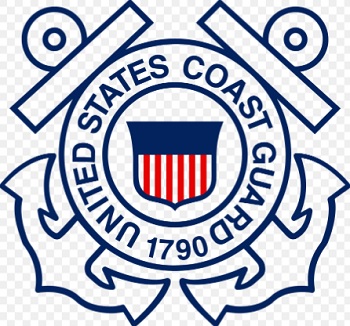 The US Coast Guard said it is searching a portion of the Gulf for a 35-year-old fisherman who reportedly fell overboard from a commercial fishing vessel early Saturday (Dec. 2), about 138 miles southwest of Port Fourchon. The man overboard report was radioed in around 2 a.m. from a vessel relaying the message from the commercial fishing vessel Miss Winnie, the USCG said in a statement. more, >>click to read<< We will update, as we get information. 14:00
The US Coast Guard said it is searching a portion of the Gulf for a 35-year-old fisherman who reportedly fell overboard from a commercial fishing vessel early Saturday (Dec. 2), about 138 miles southwest of Port Fourchon. The man overboard report was radioed in around 2 a.m. from a vessel relaying the message from the commercial fishing vessel Miss Winnie, the USCG said in a statement. more, >>click to read<< We will update, as we get information. 14:00
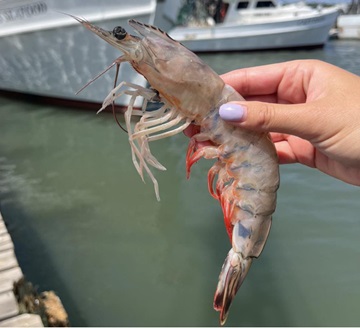
‘Catastrophic crisis’: Imported shrimp flood US market
Foreign shrimp imports are overwhelming the country’s inventories of shrimp and driving market prices for locally sourced shrimp to record lows, prompting widespread calls from elected officials and organizations throughout southern Atlantic and Gulf Coast states for the federal government to declare a fishery resource disaster. Governors of coastal states from North Carolina to Florida to Texas are being pressed to ask U.S. Commerce Secretary Gina Raimondo to determine a fishery resource disaster for the South Atlantic and Gulf of Mexico shrimp fishery. In what one North Carolina coastal county’s board of commissioners refer to as an “unprecedented catastrophic crisis,” shrimpers are struggling to maintain operations because they’re making substantially less for their catch while paying historically high fuel prices and other inflation-driven costs. Shrimpers are also being forced to dock their freezer boats, or vessels with onboard freezers, because they can’t move their product in a market flooded with frozen shrimp from overseas. >>click to read<< 09:40
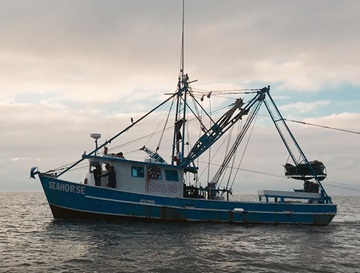
Gulf Coast wins against ‘far-left activists’ in NOAA decision, Alabama officials say
U.S. Sens. Katie Britt and Tommy Tuberville applauded the National Oceanic and Atmospheric Administration rejecting a petition to establish a mandatory 10-knot speed limit and other vessel-related mitigation measures in the Gulf of Mexico.“I was glad to see the NOAA come to their senses and reject this part of the Biden Administration’s overreaching regulatory agenda in the Gulf of Mexico,” said Tuberville (R-Auburn), who has written two letters to administration officials on the issue. “Unfortunately, we still have a long way to go. Designating a Critical Habitat for the Rice’s whale throughout this expansive area would impose undue burdens and restrictions on all vessel traffic, especially in and out of the Port of Mobile.” >>click to read<< 10:09
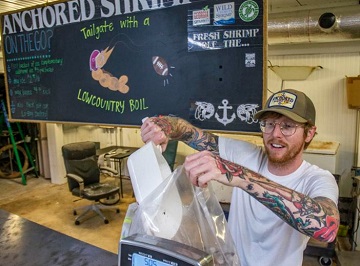
Shrimp Alliance request fisheries disaster declaration
There’s no other way to put it if you ask Aaron Wallace. Despite a decent catch by the eight shrimp boats that supply Anchored Shrimp Co. in Brunswick, the prices fishermen are getting for their hauls aren’t what they should be. “It’s been one of our toughest years,” Wallace said. He and his father, John Wallace, own Anchored Shrimp and operate the Gale Force, one of the boats that serve the company’s retail and wholesale business. The Southern Shrimp Alliance, for which John Wallace serves as a member of the board of directors, is calling the flood of imported shrimp a crisis. The alliance asked the governors of Alabama, Florida, Georgia, Louisiana, Mississippi, North Carolina, South Carolina and Texas in a letter on Aug. 25 to collectively request a fisheries disaster determination by the U.S. Secretary of Commerce for the U.S. shrimp fishery. >>click to read<< 11:06
Louisiana shrimpers, lawmakers unite to protect domestic fisheries as season begins
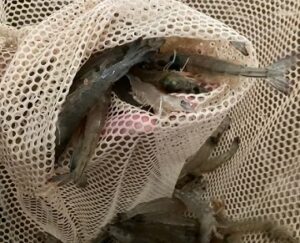 The Louisiana Shrimp Association joined in a letter that said the influx of imported shrimp has proven especially problematic for domestic harvesters. Nineteen other allied organizations and companies, representing more than 4,000 seafood businesses of the U.S. Gulf of Mexico and South Atlantic region also signed onto the letter. “Despite rising costs for fuel and labor, the price of Gulf shrimp, for example, has not increased since 1980. For the past 40 years, the average dockside price of Gulf shrimp has ranged from $1.50-$2.00 per 2 pounds,” the letter said. The Louisiana Legislature on June 6 presented House Concurrent Resolution 113 to the Secretary of State. The resolution urges Congress to ban the import of shrimp and crawfish from outside the United States. >click to read< 11:24
The Louisiana Shrimp Association joined in a letter that said the influx of imported shrimp has proven especially problematic for domestic harvesters. Nineteen other allied organizations and companies, representing more than 4,000 seafood businesses of the U.S. Gulf of Mexico and South Atlantic region also signed onto the letter. “Despite rising costs for fuel and labor, the price of Gulf shrimp, for example, has not increased since 1980. For the past 40 years, the average dockside price of Gulf shrimp has ranged from $1.50-$2.00 per 2 pounds,” the letter said. The Louisiana Legislature on June 6 presented House Concurrent Resolution 113 to the Secretary of State. The resolution urges Congress to ban the import of shrimp and crawfish from outside the United States. >click to read< 11:24
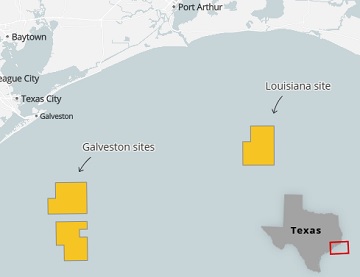
First offshore wind leases off the Texas coast offered for bidding
The federal government on Thursday announced the first-ever chance for companies to lease areas in the Gulf of Mexico to build wind farms, including two parcels roughly 30 miles off the Texas coast near Galveston. Renewable energy developers will likely compete for the leases with firms that are better known for another kind of offshore construction: Oil and gas giants such as Shell and TotalEnergies qualified to join the bidding. Leaders of the traditionally fossil fuel-focused companies say their climate goals make investing in offshore wind critical. Both businesses are already involved in developing wind power in the Atlantic, including near New Jersey, New York and Massachusetts. >click to read< 10:02
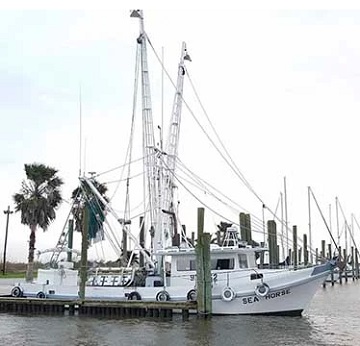
Mary Meaux – Our shrimping industry keeps taking hits with foreign imports
Days before the opening of the Gulf of Mexico commercial shrimp season, a group of shrimpers held a rally in Texas City to bring awareness to the plight of Texas shrimpers and the shrimping industry in general. Tricia Kimball, whose husband Kyle is president of the Port Arthur Area Shrimpers Association, explained the effort. The season for the Gulf of Mexico state and federal waters reopens 30 minutes after sunset Saturday, according to the Texas Parks and Wildlife Department. Kyle Kimball is a third-generation commercial shrimper. He remembers standing on a 5-gallon bucket as a child helping his father pick through shrimp. It’s been his lifelong career but last year when diesel prices hit $5 per gallon, he only went out once because it was too expensive. >click to read< 20:06
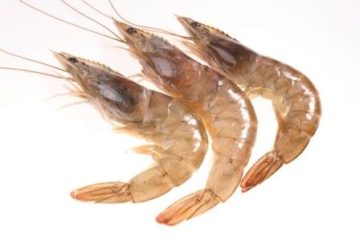
Commercial Gulf Shrimp season reopens Saturday
The Gulf of Mexico commercial shrimp season for state and federal waters will reopen 30 minutes after sunset on Saturday, July 15, 2023. “The annual mid-May closure protects brown shrimp until they can reach larger, more valuable sizes during their major period of emigration from the bays to the Gulf of Mexico,” said Robin Riechers, TPWD Coastal Fisheries Division director. Federal waters (from nine to 200 nautical miles offshore) will open at the same time as state waters. The National Marine Fisheries Service chose to adopt rules compatible with those adopted by Texas. >click to read< 16:41
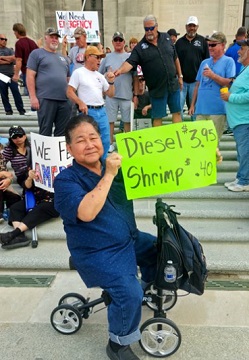
Cheap Imports Leave US Shrimpers Struggling to Compete
“We are paying to work. We are paying to feed our nation,” said Kindra Arnesen, at a rally on the steps of Louisiana’s towering capitol in Mid-May. “I ask for immediate emergency action at all levels. Nothing else will be accepted by this group.” The 45 year-old shrimp harvester, who has been hailed as a voice for the Gulf and has fought for decades to sustain the domestic shrimp industry, was surrounded by nearly a hundred other harvesters who had traveled inland from their homes along coastal Louisiana to Baton Rouge to rally for livable shrimp prices. “Nobody can make money,” said Ronald Johnston, a 64-year-old shrimper who came to the U.S. in 1981 as a Vietnamese refugee. At the rally he held a lime-green poster that read: “Shrimp: $.40 cents. Diesel: $3.95” while sitting on a scooter that helps with his mobility. Photos, >click to read and comment< 08:01
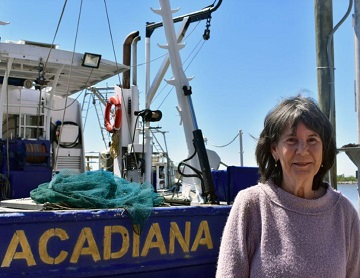
A lifetime of research links Gulf of Mexico ‘dead zone’ to Midwest fertilizer runoff
In the summer of 1985, Nancy Rabalais set sail on a research vessel into the Gulf of Mexico — and into the scientific unknown. Over nearly four decades, Rabalais has become a giant in her field. She has completed hundreds of interviews with journalists, presented a TED Talk, testified to Congress multiple times, mentored countless students at LSU and published nearly 160 studies. Now 73, Rabalais said she doesn’t plan to go on the research cruises anymore due to her age and health issues. She remains engaged in her work, even as she trains a new generation of scientists to take over. >click to read< 10:04
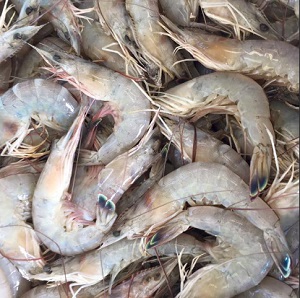
Alabama Implements Shrimp Harvesting Ban to Promote Wise Stewardship
The Alabama Department of Conservation and Natural Resources announced in the press release (below) that all inside waters will temporarily close for commercial and recreational shrimp harvesting starting from May 1, 2023. This closure is in accordance with the state laws and regulations and is aimed at promoting wise stewardship of Alabama’s natural resources. The inside waters, which are defined as all waters north of a specific line along the Gulf of Mexico, will reopen for shrimp harvesting on June 1, 2023. >click to read< 13:04
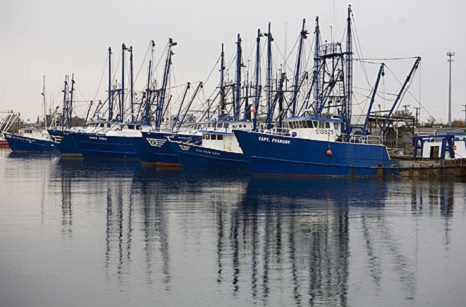
Untangling catch shares with Lee van der Voo – Catch shares have changed fisheries and fishing communities across the U.S.
I recently saw some great reporting by the New Bedford Light and ProPublica about how the billionaire Dutch family that owns Blue Harvest Fisheries has emerged as a force in groundfish fishing off the coast of Massachusetts. These are very wealthy, powerful equity groups and corporations that are acquiring access to the fisheries and passing the cost of owning them and fishing them onto fishermen. There’s been profound disenfranchisement of people who used to have a more personal stake in fishing and seafood. Everyone from indigenous communities in Southwest Alaska whose history with halibut goes back to the beginning of time to small-boat, family operations around the United States everywhere have been losing access. Whole communities have fallen apart over that. >click to read< 08:15
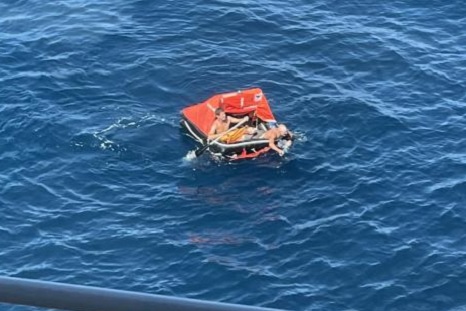
Washburn & Doughty boat with East Boothbay chief mate rescue 2 drifting fishermen
At the 11:30 watch change, Goodwin had just come to the pilothouse to relieve the captain, when the captain noticed something in the distance. “Is that a flare?” he asked. Goodwin checked using binoculars and answered, “It’s a life raft.” The small life raft with two fishermen from Destin, Florida was 1.25 nautical miles away. One of the men was standing up in the raft waving a flare. As the Linda Moran’s crew would later learn, that flare was the last of six the fishermen had. The rest were already used to try to signal ships during the two and a half days they drifted in the Gulf of Mexico. 11 photos, >click to read< 08:08
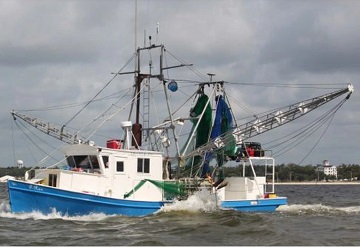
USDA to buy $25 million in shrimp
The United States Department of Agriculture is purchasing $25 million in shrimp caught in the Gulf of Mexico and South Atlantic. The purchase will provide relief to Louisiana’s shrimp industry, according to Congressman Garret Graves’ office. The USDA will use the shrimp for food nutrition assistance programs, according to Congressman Clay Higgins’ office. The USDA made similar purchases of shrimp in 2020 and 2021. >click to read< Southern Shrimp Alliance Applauds Announcement of $25 Million in Additional USDA Section 32 Purchases of Shrimp – >click to read< 15:18
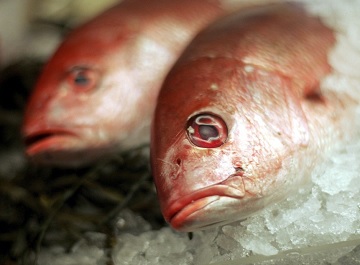
Catch Shares Enable Wealthy Landlords to Gobble Up Local Fisheries
A recent investigative report has reignited public discussion over catch shares, a controversial approach to fisheries management that privatizes the rights to fish. The investigation exposed how Blue Harvest Fisheries, owned by a billionaire Dutch family, became the largest holder of commercial fishing rights in New England, benefiting from lax antitrust regulations and pilfering profits from the local fishermen who work under them. As a commercial fisherman in Mississippi, I know these dynamics go well beyond New England. Here in the Gulf of Mexico, private equity firms and other large investors have come in and gobbled up the rights to fish, driving up the cost of fishing access and making it prohibitively expensive for fishermen like me to harvest fish in our own backyards. >click to read< 07:55
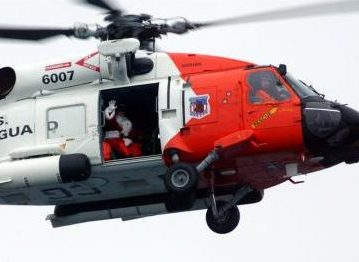
Coast Guard medevacs fisherman near Venice, Louisiana
The Coast Guard medevaced a 55-year-old man Sunday from a fishing vessel approximately 10 miles east of Venice, Louisiana. Watchstanders at Coast Guard Sector New Orleans received a call at approximately 4:00 p.m. that a crewmember aboard the fishing vessel F/V Thanh Nhut Li had reportedly sustained severe injuries to the leg. The watchstanders directed the launch of a Coast Guard Air Station New Orleans MH-60 Jayhawk helicopter aircrew to assist. The helicopter aircrew arrived on scene, hoisted the patient and transported him to University Medical Center in New Orleans. The crewmember was last reported in stable condition. -USCG- >Video<
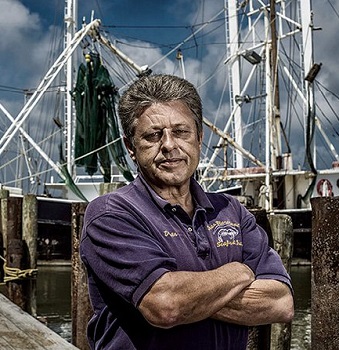
The Dead Zone – Nothing Here Gets Out Alive
With an easy drawl, Dean Blanchard, the owner of Dean Blanchard Seafood in the barrier-island town of Grand Isle, Louisiana, makes an understated observation: “There’s a reason they call it a dead zone. When the dead zone comes, everything’s dead. We can’t catch dead stuff. We’re in the live stuff business.” What Blanchard is talking about is the Gulf of Mexico “dead zone,” an enormous area in which, every spring, an overgrowth of algae and other vegetation absorbs dissolved oxygen from the water and kills all animal life. “This year,” Blanchard says, “we had shrimp jumping on the beach, committing suicide, trying to get out of the water because there’s no oxygen.” The result is an economic disaster. To find live shrimp, fishers have to ply their boats as far as fifty miles from shore. “With the price of fuel, you don’t want to go too far,” Blanchard says. His company’s annual haul has declined from twelve million pounds of shrimp a year to under five million. He used to employ sixty workers—now he’s down to thirty. >click to read< 11:49

Joel Dejean: Turn the Tide Against the Texas Gulf Wind Farms
The Biden Administration announced last week that the first offshore wind farms in the Gulf of Mexico will be positioned off the coasts of Texas and Louisiana. The first selected area was described approvingly in the July 22 issue of The Texas Tribune by Mitchell Ferman. It is “24 nautical miles off the coast of Galveston, covering 546,645 acres, bigger than the city of Houston, with the potential to power 2.3 million homes, according to the U.S. Interior Department’s Bureau of Ocean Energy Management.” The other project, praised in Houston Chronicle headlines, will be near Port Arthur [Texas] covering 188,023 acres, 56 miles offshore, with power potential estimated at 799,000 homes. Public hearings are to start in August. Two issues come immediately to mind. First, in the description of both projects, the phrase ”potential to power” is used. The figures given represent 100% potential productive capacity, but the wind usually delivers only 30%, and often even less. >click to read< 11:25
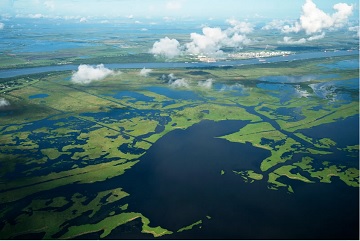
The Controversial Plan to Unleash the Mississippi River
“There’s not a son of a bitch in this parish, or within this industry, that doesn’t want coastal restoration,” Acy Cooper, the president of the Louisiana Shrimp Association tells me when I find him repairing his boat in Venice, the southernmost harbor on the Mississippi River. Cooper is a third-generation shrimper; he knows that if the marshland is not saved, that chain will come to an end. The necessary gradient of water will disappear, replaced by salty ocean. So Cooper supports some projects—using dredged mud to build marsh, for instance—but worries that the diversion will make the water near Venice too fresh, pushing shrimp out into the Gulf. The small boats used by many shrimpers can’t travel that far. He compares the diversion to a gun held to his head: “Either let me die slowly and I can adapt, or you just pull the trigger and kill me now. That’s the way I feel about it,” he says. “If you pull the trigger now, I’m dead.” The Army Corps’ draft environmental impact statement, released in spring 2021, confirmed many of Cooper’s worst fears,,, Big article, big read. >click to read< 19:22

U.S. Coast Guard: Search suspended for missing commercial fisherman off South Padre Island, Texas
The Coast Guard has suspended its search Sunday for a 35-year-old fisherman who went missing off South Padre Island, Texas, Saturday. Coast Guard crews searched approximately 1,903 square miles for over 32 combined hours. Coast Guard Sector Corpus Christi command center watchstanders received a call at 5 a.m. Saturday on VHF-FM channel 16 from the master of the 65-foot commercial fishing vessel F/V Santa Fe stating one of his crew members was missing 35 miles offshore Land Cut. The man was reportedly not wearing a life jacket at the time of his disappearance. >click to read< 18:21
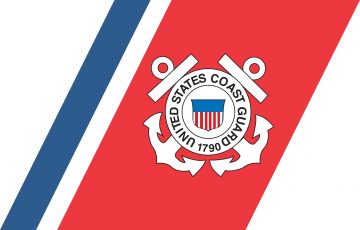
Coast Guard searching for missing commercial fisherman off South Padre Island, Texas
The Coast Guard is searching for a missing 35-year-old fisherman in the water off South Padre Island, Texas, Saturday. Coast Guard Sector Corpus Christi command center watchstanders received a call at 5 a.m. on VHF-FM channel 16 from the master of the 65-foot commercial fishing vessel F/V Santa Fe stating one of his crew members was missing 35 miles offshore Land Cut. Missing is a 5-foot, 10-inch tall, 150-pound Latino male last seen wearing a tank top and shorts. The man was reportedly not wearing a life jacket. >click to read< 11:41

Fishing vessel crew member alleges inadequate medical treatment after cutting hand with machete
Nicholas A. Lester filed a complaint June 28 in Galveston County 56th District Court against Katie’s Seafood LLC and the F/V Pisces LLC alleging negligence, unseaworthiness and other claims. According to his complaint, Lester was employed by the defendants and was a crew member on the F/V Bottom Line commercial fishing vessel which was operating in the Gulf of Mexico on April 14, 2021. He claims that as he was chopping eels to prep for baiting hooks, he cut his left hand with the machete and began to bleed “profusely.” Lester further claims that he received no assistance from crew members until a half hour later when the vessel’s captain treated his wound with iodine and Gorilla Glue and wrapped it with gauze and electrical tape. >click to read< 08:41
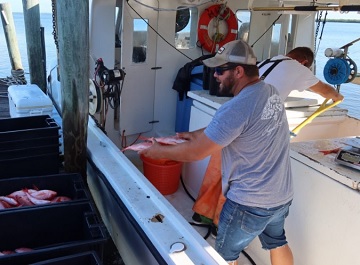
Potential aquaculture sites in Gulf of Mexico concern commercial fishermen
Capt. Casey Streeter’s crew is waist deep in the commercial icebox on its 36-foot Thompson boat. Ice is shoveled overboard, while fish are pulled from the ice into bins, some separated by size and others by species. Fishermen Greg Trammell and Jimmy Bergan just returned from being on the water for seven days. Bins and baskets full of fish filled to the rim as they offload their catch to be sold at Island Seafood Market in Matlacha. It is owned by Streeter and his wife, where they catch and sell their own fish. Streeter is a first-generation fisherman, fishing commercially for 10 years. Streeter’s livelihood relies on the health of marine ecosystems. With the National Oceanic and Atmospheric Administration’s search for aquaculture opportunity areas in the Gulf of Mexico, he fears the lifeline of his career may be at stake. >click to read< 09:35
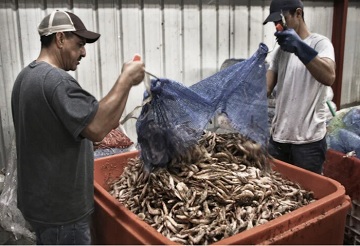
Delcambre shrimp processor overcoming old and new problems to survive
Gulf Crown Seafood’s Jeff Floyd and his son Jon agree that every year in the seafood business is unique. Each year new problems arise and are added to the same old ones continuously sticking around. Last year new problems arising from Covid and Hurricane Ida were added to the old ones; H2B visiting worker visa, labor shortages, import prices and product availability. “We weren’t affected directly by Hurricane Ida,” said the senior of the Floyds. “But without production this plant doesn’t survive. They only way we get production is with the boats. I don’t know exactly how many we lost out of the fleet from the storm, but talking to those at the docks their were a lot a fisherman whose boats won’t be able to be salvaged.” Gulf Crown Seafood in Delcambre is one of approximately seven shrimp processors left Louisiana. >click to read< 12:58






